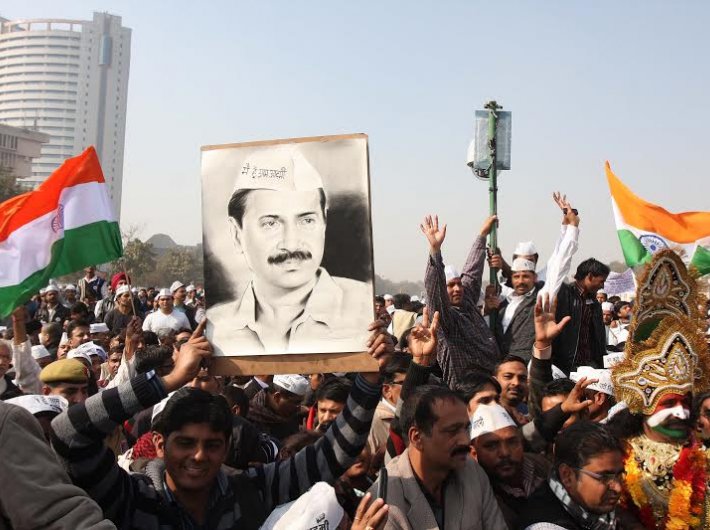Kejriwal has spoken, AAP has said no to polls outside Delhi. Reading a one-year saga with a pinch of salt and loads of Orwell-inspired Animal Farm
The second political revolution – that of the Aam Aadmi Party, or AAP – in the history of democratic India seems to have fizzled out. The party has finally announced that it would not contest the assembly elections in Haryana, Maharasahtra, Jammu and Kashmir and Jharkhand – all due in the next few months, with Haryana going to polls sometime in September-October.
To put in context, AAP scored a cipher in the 10 seats it contested in Lok Sabha in Haryana. After the gala show in Delhi assembly elections in late-2013, Yogendra Yadav, the second in command in the party after Arvind Kejriwal, had announced that AAP would contest all assembly seats in Haryana. He had also launched a campaign "Dilli hui hamari, ab aayi Haryana ki baari".
The threat looked quite convincing to some sections, considering both Kejriwal and Yadav are from Haryana – the former from Bhiwani and the latter from Rewari. Yadav even contested the Lok Sabha seat from Gurgaon but lost his deposit, like tens of others the party fielded in 400-plus seats. In fact, all AAP candidates contesting from the state Haryana lost their deposits. In view of this, AAP’s latest announcement has no surprise or shock element.
ll the hits and misses of AAP are now common knowledge; here is its chronological fall – with a pinch of satire.
Old Major (Anna) had a dream. A dream of corruption (Mr Jones)-free India. He shared his dream with Napoleon (a civil servant) and Snowball (a journalist) and others, and together they launched a campaign against corruption with an aim to cleanse politics. Old Major wrote the first commandment of the movement – We are apolitical. They sang and taught a revolutionary song “Beasts of Politics” which struck a chord with the countrymen and stirred the hibernating conscience of the country.
But, Napoleon and Snowball were not happy with the first commandment of the campaign and harbored some other ambitions which the Old Major disproved of. They hijacked the Old Major’s movement and, along with some other equal animals, built Mango Farm – a republic of Utopia. Then they rewrote the first commandment of the Old Major and hung it outside the farm. Now it read – We are political.
Now, they summoned all the animals to gather in the barn for the song. This became a ritual at the farm as Napolean believed “all great karmas begin with dharnas”.
When the animals started singing “Beasts of Politics”, Napolean interrupted and asked them to correct themselves. Snowball got the clue and said he will sing first and they can join in the choir. And now they sang “Politics of Beasts” oscillating their sickles in the air.
When they had finished the song, Napolean began his speech: “Dear comrades, last night I had a dream. A dream of Utopia. Of a Republic which is free of Politics of Beasts, corruption, anarchy, poverty and prejudices. The animals at the Mango Farm would pledge today with me that we will cleanse the political system of the country and re-define the politics.”
In the end, Napolean asked Snowball to share the seven commandments they had written to wage the rebellion. The seven commandments were as:
- All animals are equal.
- Mango Farm will cleanse the political system.
- Mango Farm will never take any support from any other political party.
- We will not take official car and official house.
- We don’t believe in politics of freebies, casteism and khaps.
- Mango Farm will fight against corruption.
- We will pass the joka-yukt.
- These were carved on a teakwood board in bright red colour and hung in the barn of the farm.
Napolean asked everybody at the farm to repeat all the seven commandments one-by-one after him and then disperse with the song of “Politics of Beasts” on lips and polls in mind. But funds to contest polls were scarce. Therefore, all animals are put on the job to contact the ideology sympathizers – like Guevara and Chimera – across the river to donate funds – which they happily do with their own motives to be satisfied later on.
Now armed with ample funds, the seven commandments and the song of “Politics of Beasts”, Mango Farm went to polls and got the second largest mandate which even Benjamin (a psephologist) – the oldest and wisest of all – had not expected. But yet, far from forming the government. The mandate was like this:
Lotus Farm – 32
Mango Farm – 28
Palm Farm - 8
Others – 2
The Palm Farm looked at the Lotus Farm as the bigger enemy than the Mango Farm and decided to give it a helping hand to keep Lotus away from the throne.
Napolean immediately called a meeting in the barn and put the offer forth before the animals of the Mango Farm. Benjamin had an objection and reminded Napolean of the commandment “Mango Farm will never take any support from any other political party”.
Napolean interjected and asked Snowball to read the correct commandment. Snowball read it: “Mango Farm will never take any support from any other political party without public referendum”.
Now the other animals are asked to take referendum from the public and give it to Napolean and Snowball, who later said that the public wanted them to form a government with Palm Farm. And they formed the government.
Referendum now became a norm at the farm. Chinar Farm, a disputed territory which the world could not sort out, should be sorted out through referendum from the people of the territory, Mango Farm suggested.
Next day, they gathered at the barn for the oath ceremony and sang the song “Politics of Some Beasts”. Benjamin wondered if they forgot the song, which actually was “Politics of Beasts”. But he now kept quiet.
A few days after initiation into the government, Snowball and others were seen coming in big cars. Animals of the farm were taken aback and some animals questioned that and reminded them of the commandment “We will not take official car”. Snowball sneered and said they got it wrong and the commandment was “We will not take official car with beacon.”
Next day, when Napolean was questioned about shifting to the official house and was reminded of the commandment “We will not take official house”, he countered that it was “We will not take official house which is big”.
Gradually, the discontent among animals of the farm increased and more and more animals started questioning the ideology of Mango Farm. Following this, Napolean asked Snowball to “remove the board of commandments which had faded under the sun and hang a freshly painted board”.
Next day, the board in the barn read like this:
- All animals are equal but topiwala animals are more equal than the others.
- Mango Farm will cleanse the political system with a broom.
- Mango Farm will never take any support from any other political party without public referendum.
- We will not take official car with beacon and official house which is big.
- We don’t believe in politics of freebies, casteism and khaps. We believe in more of it.
- Mango Farm will fight against corruption if Lotus gives it evidence.
- We will pass the joka-yukt if there is joke in it.
When Napolean realised that there was no joke in joka-yukt and that dharna was not reflecting in the karma, he resigned from the chief post. Now the animals started revolting against him and refused to expand to other territories and Napolean agreed without taking referendum this time.
(The article is, of course, an adaptation and parody of Animal Farm of George Orwell.)

